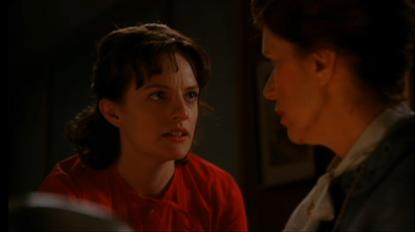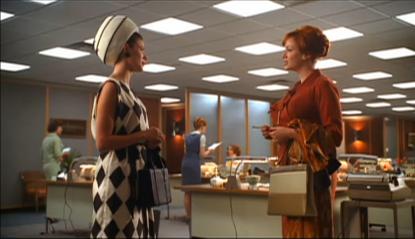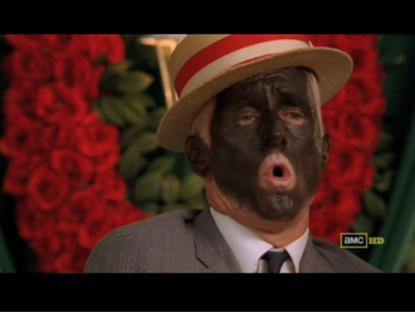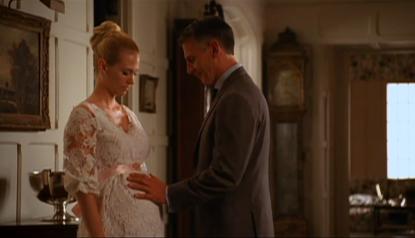This week's episode of Mad Men, paid a lot of attention to women's issues. After the Don-centric last half of season two, it seems that the writers are returning to what made the show so dynamic and addictive in the first place: an analysis of the tension between the sexes in the early sixties, the last time the "natural" order of gender roles was carried out without discussion, and perhaps the time that pushed the change America saw in the late sixties and seventies. We saw Peggy take advantage of her new found confidence and we saw the dynamics of the different married women with their husbands. In fact, every character at Sterling Cooper who is paid attention to with regularity and is married was given at least a momentary snapshot with their spouse.
First off: Peggy. I hypothesize that she is as much a star of the show as Don. The two of them pretty much had equal billing this episode. As a character, Peggy has a lot in common with Don. Both come from working class backgrounds. Neither are traditionally educated and rolled into their positions on raw talent. Both feel like outsiders looking in. Don has done a good job hiding this, but it is still a factor for him. Peggy is starting to realize that everyone feels like an outsider looking in. And since she's discovered that it's easy to "have that stupid look on her face," and be attractive and charming to men, she's figured out that it's equally as easy to assert herself in the men's role as well. Working on a campaign for Bacardi Rum on a Saturday, her male counterparts buy some pot. They lock her out of the office and smoke it. When she finally gets back in she makes a stand. "I'm Peggy Olson," she says, "and I want to smoke some marijuana."
I made a mistake last week when I determined that Peggy "got on board," in the sense that she decided to act like a "lady" in order to get what she wanted. She simply discovered that it was no mysterious task to act like a "lady" and influence men through sexual guile. She, despite all instincts to the contrary, is just as able to manipulate that sort of influence as any woman. Knowing that makes it all the more fun for her to not do it. Peggy is a proto-feminist, feeling her way through a man's world on trial and error. She is developing a personal philosohphy as she goes along, experimenting, influencing, discovering. In this episode there was a generational dichotomy set up between Peggy and her new secretary, Olive. Olive casts disapproval on Peggy's pot smoking ways.

But Peggy realizes what we've all been shouting at her since she got promoted to Junior Copywriter at Sterling Cooper:
"The thing is, I have a job. I have my own office with my name on the door. And I have a secretary. And that's you. And I'm not scared of any of this… But you're scared. Oh my god, you're scared. Don't worry about me. I am going to get to do everything you want for me. I am going to be fine, Olive. I really am."
Peggy smoked pot because she was thinking about her future, despite what Olive says to the contrary. The only way to compete with the boys is to do what they do, be on their level, even if that involves idiocy. When Peggy says, "I am so high," she's not just talking about the influence of the marijuana, but the realization she's been forming of late. Later on she says, "I'm in a really good place right now." The two statements are one and the same.
The married couples of Mad Men were largely addressed en masse, save Joan and her rapist husband Greg (I refer to him as a rapist not to be alarmist, but to remind us of his character. He has been set up as evil, but he is a wolf in a sexy sheep's clothing. We mustn't overlook the teeth). Joan and Greg prepare for a dinner party at their (Joan's) apartment. Greg vacuums with about as much finesse as a lumberjack (forshadowing of his lack of skills as a surgeon, perhaps?) and snaps the cord from the socket with a yank. "Don't do that, you'll break it," chides Joan. "Who told you that?" he asks. "I've done it," she replies. Joan knows from experience. She is practical and informed. Her husband just went to medical school.
Moments later he comes over the table Joan has been setting and criticizes it. His analysis of the placecards is from a place of desperation: he wants to impress his boss and make sure he is at the head of the table. Joan insists this is not how it's done and it would look worse to break etiquite than not to kiss the boss's ass. "I don't want to get into a fight right now," he threatens. "Then stop talking," Joan smartly replies without skipping a beat. It is she that comes up with an equitable compromise for the table setting: a buffet where people can sit where they will. I just wish the producers had seen fit to show a shot of the dinner table to show where the boss, a seemingly genial and happy guy, ended up sitting.
That boss's wife revealed a lot to Joan in this episode. Not all doctors are wealthy, and most aren't at the start of their careers. She warns Joan not to get pregnant and implies that she'll have to keep working for some time to come. "The fact that Greg can get a woman like you makes me feel good about his future, no matter what happens," she says, meaning to compliment Joan. But all she ends up doing is point out to Joan that the guy she married is not only a rapist, but a crappy doctor. Their success as a couple depends more on her than on him; Greg will become cheif resident if she's charming enough and performs for those who would judge him. He pulls out her accordian and practically forces her (cajoling someone to perform can be loving and appreciative of talent, but when a rapist does it…) to play to the crowd after it is revealed that he's not as good a surgeon as she had hoped. She obliges, but as she does, her expression becomes downtrodden and confused. She's doing this to make him look good. This, she seems to think, is not what I signed up for.
Contrasting Joan and Greg's relationship is that of Jane and Roger Sterling. Joan bumps into Jane in the office and the two exchange "unsults."

Joan: [blows smoke in Jane's face]
Jane: I keep losing weight. Where are you living now?
Joan: Same old place, but we're looking. We're thinking about Riverdale.
Jane: I get a nosebleed anywhere above 85th Street.
Jane's relationship with Roger is in everyway unlike Joan and Greg's. The Sterlings' opulent garden party on "The Island" was the scene for much of the episode. It is here that we see the dynamics of the rest of the married couples.
Roger and Jane are "conspicuously happy." Roger serenades her at the party, blithly unaware of his offensiveness, in front of everyone looking like this:

Pete "The Weasel" Campbell and his wife Trudy uphold their reputation (to me) as Phony McBluebloods and dance an elaborate, choreographed Charleston, a dance that was popular 40 years earlier.
Harry Crane and his wife Jennifer are awkward; they don't quite fit in. She pushes him to insert himself in conversation and on the dance floor. He, literally, pulls her back.
And Betty and Don try to keep up appearances. She, in her very pregnant state, gets hit on and likes it:

Don sees how happy Roger is and seeks out Betty for a kiss. The episode ends with the couple embracing in the dark, but, as creator Matt Weiner points out, they are really kissing other people.
There's a lot of singing and performance in this episode: Roger's blackface, Pete and Trudy's Charleston, Joan's acordian serenade, Paul Kinsey's Tiger Tones revisiting. These serve to point out the larger, revisited theme that runs through the show. Everything's a farce. All the world's a stage. Don is an alter ego. "It's all smoke and mirrors," Betty said last week. The people in marriages are in them for various reasons, and have very different interactions with one another, but to outsiders, the goal is to look like you're in love. Peggy realizes that it's easy to be like other women, but it's not easy for them to be like her. Once the instability of the structure is revealed, like the back side of a stage set, the world of Mad Men could come crumbling down. We know that JFK's assasination is looming, as is the sexual revolution and the women's movement.
This week Grandpa Gene and Sally read The History of the Decline and Fall of the Roman Empire. He's trying to teach her something, since her mother's answer to everything is, "Go watch TV." But maybe he's telling us something, too. Sally reads: "Fashion was the only law. Pleasure was the only pursuit." "You just wait," says Grandpa Gene through narrowed eyes, "all hell's gonna break loose."


